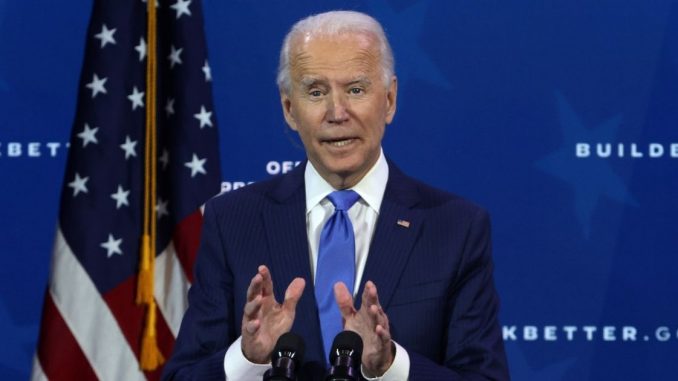
Presumptive president-elect Joe Biden spent the entirety of the campaign attacking President Donald Trump’s “America first” approach to both foreign and domestic policy.
But in an interview with The New York Times published Wednesday, the Democrat introduced a new tone on how he views the international landscape and how the country will approach its geopolitical adversaries should he be inaugurated next month.
Biden spoke to columnist Thomas Friedman about a number of topics, including the possibility of negotiating with a GOP-run Senate, his plans for a new stimulus bill and how he would deal with the country’s adversaries.
The interview was conducted under the assumption from both parties that Biden has won the election, which is in fact still contested.
The 78-year-old embraced being crowned the winner of the election and told The Times he has big plans for the country both at home and abroad.
He said he would go back to the drawing board regarding relations between the U.S. and China, and that he would re-enter the Iran nuclear deal and end sanctions on the world’s largest state sponsor of Islamic terrorism, depending on a number of factors.
Biden then said something stunning, which goes against everything he has claimed to stand for throughout the campaign.
He invoked Trump’s “America first.”
Regarding China and trade, Biden seemed to embrace Trump’s policies, which have drawn the ire of Democrats and foreign governments for years.
“I want to make sure we’re going to fight like hell by investing in America first,” Biden told Friedman.
“I’m not going to enter any new trade agreement with anybody until we have made major investments here at home and in our workers,” he added.
What?
Was this just another case of plagiarism from the career politician?
Biden notably told the same publication just three weeks ago he intends to throw policies that place American interests above those of other countries into the trash bin of history.
As New York Times reporter David Sanger wrote on Nov. 9, Biden “makes no secret of the speed with which he plans to bury ‘America First’ as a guiding principle of the nation’s foreign policy.”
“Mr. Biden said in a statement to The New York Times, he wants to bring an end to a slogan that came to define a United States that built walls and made working with allies an afterthought — and, in Mr. Biden’s view, undermined any chance of forging a common international approach to fighting a pandemic that has cost more than 1.2 million lives,” Sanger added.
Biden even offered a quote on the topic.
“Tragically, the one place Donald Trump has made ‘America First’ is his failed response to the coronavirus: We’re 4 percent of the world’s population, yet have had 20 percent of the deaths,” Biden said.
How does one go from planning to bury “America first” on Nov. 9 to saying on Dec. 2 that “we’re going to fight like hell by investing in America first”?
Biden indeed has a long track record of borrowing slogans and quotes from other public figures.
But to so quickly seem to embrace the words of Trump, his adversary, in adopting an “America first” approach to China and others is a quick turnaround, even for the former vice president.
It’s almost as if demonizing popular policies put in place by the president didn’t exactly work out for down-ballot Democrats, who will now cling to a narrow House majority.
Republicans also have a good chance at retaining control of the Senate.
Has Biden’s team realized that American prosperity is quite popular?
Four years of Trump’s leadership in the White House has proven America can be a leader internationally while investing at home.
More importantly, both things were done with no new wars, as foreign policy hawks essentially had no voice at the table in Trump’s administration.
Those hawks are reportedly lining up for jobs in a Biden administration.
But Biden, whose supposed victory is doubted by almost half of American voters, according to a recent Rasmussen poll, is now signaling that if he is indeed elected, he might not be so quick to adopt the policies of the radical wing of his party, or of a Washington establishment eager to get back to business as usual.
It is, no matter the context, interesting that Biden would specifically use the phrase “America first.”
To be fair, though, voters never got a chance to hear much from Biden himself about his foreign policy plans or positions.
Not only did the Democrat not engage much with reporters throughout the campaign, but he and the president never debated foreign policy with any degree of substance, as the partisan moderators picked by the supposedly nonpartisan Commission on Presidential Debates found it more appropriate to ask the candidates about subjects such as racism.
Now, with Biden declaring himself the winner of the election, “America first” is apparently still on the table for a man who has struggled to come up with original ideas.
Biden’s plans for dealing with the coronavirus pandemic throughout the duration of the campaign read an awful lot like Trump’s.
Now, his foreign policy positions are also beginning to sound eerily similar.
